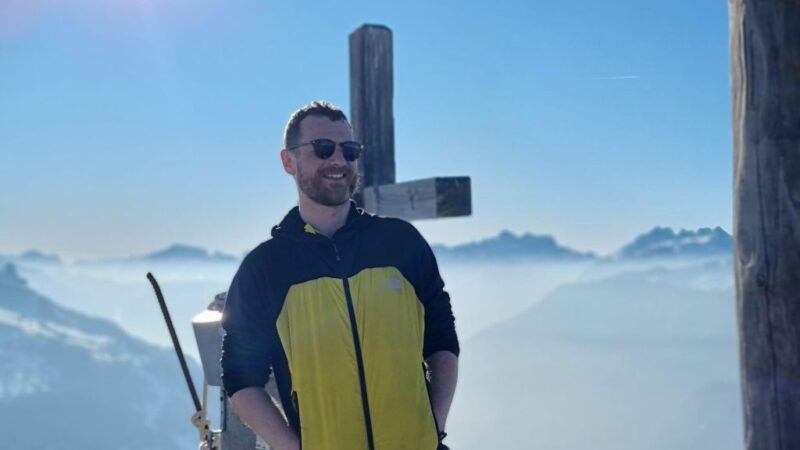

An A&E nurse is swapping the resus rooms of University Hospitals Sussex for the world’s biggest mountains as he takes part in a once-in-a-lifetime expedition that combines extreme sport with climate change awareness.
Christopher Smith is part of a team taking on the Last Ride project, where they aim to become the first people to climb and ski the tallest mountain on each of the seven continents – from Kilimanjaro at the peak of Africa, to Mt. Vinson in the far-gone plains of Antarctica, and culminating in a nail-biting winter expedition on Mt. Everest.
While the project will represent a world first in global ski mountaineering, the overall ambition is to develop a greater understanding of climate change, showcase the beauty and fragility of our world, and most importantly share innovative and actionable strategies to preserve it.
The team consists of professional skiers, Ed Salisbury and Will Tucker, film director and cinematographer Jon Moy, and Chris, who provides the medical skills.
On each trip the crew will be joined by local teams who will assist them on their journey and become key characters in The Last Ride story.

They aim to be the first, and sadly most likely the last, people to climb up and ski down the tallest mountain on each of the seven continents.
The journey they take, and the film they produce, will create a platform to discuss the impact of global deglaciation on the climate crisis and the effect this is having on all of our lives.
Chris, an A&E nurse at University Hospitals Sussex NHS Foundation Trust, said: “I found out about the project through Jon – a good friend. It had always been an ambition of mine to climb these high altitude mountains.
“With my A&E skills and my mountaineering and skiing experience – I found my way in as expeditionary medic. Though I have climbed Kilimanjaro (5895m) and been to Everest Base camp (5364m) – this is a whole new challenge.
“I’ve worked in A&E at the Royal County Sussex Hospital for 10 years – progressing from healthcare assistant to resus nurse.
“I feel like the skills you acquire in A&E and resus at a major trauma unit really equip you well for this kind of expedition.
’I’ve also had extra training in wilderness and expeditionary medicine with a company called World Extreme Medicine. Their courses provide you with a really strong background for these kinds of adventures.
“This course really made me think about how to adapt the skills that we have in A&E to extreme environments like mountain terrain. Unfortunately on a mountain you do not have all of your resus equipment – so we will have to improvise.”
Chris added: “I’m looking forward to using these skills that I’ve developed and honed at University Hospitals Sussex to keep the team safe and healthy because a healthy team is a successful one. I am so grateful to UHSussex for allowing me timer off to complete the expeditions when I am needed.
“Other than acting as first responder on the mountain, my job involves a lot of planning and preparation. Each team member will have a prompt cards to cover most of the eventualities that we may come across – much like The Royal Sussex County hospital’s resus prompt cards. So for example, if anyone, or even myself were to get injured – the team would know what to do as directed by the prompt card.”
The expedition will conclude in 2024, and has already started with Mt. Elbrus, in Russia, completed in September 2021, with Kilimanjaro, in Tanzania, next on the list in April.
The trip is fraught with danger – the risk of frostbite, altitude sickness, avalanches, rock and landslides, storms and falling into crevasses to name a few – but the team feel it is worth it, to contribute to the fight for our natural world.
Chris added: “We will be working with some innovative organisations to combat our project’s carbon footprint through reduction, offsetting and capturing and will be including this process in our story. Ultimately our goal is to provide local communities with an audience to share their experiences, and to search for positive solutions to the climate crisis.”
“Sadly, we will most likely be the last people who are able to do this challenge, as the glaciers are melting at an unprecedented rate, For example scientists project that the glaciers at Puncack Jaya in Indonesia will have disappeared by this time next year. It’s a race against time.”
The team will be taking on Kilimanjaro next, but Chris’s skills won’t be needed on that trip as a local medical team has been provided. He will be joining on the September expedition to Puncack Jaya, followed by Aconcagua in Argentina and then Mount Vinson in Antarctica next year and then Everest in 2024.
People can find out more about the Last Ride and how to help raise funds for the trip at GoFundMe.